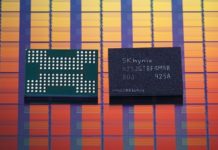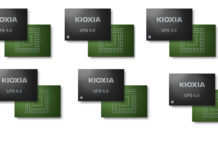Kioxia has launched its first PCIe 4 SSDs for PCs, completing a “portfolio transition to PCIe 4.0, enabling the future of gaming, mobile computing and workstation applications.”
Kioxia recently introduced CD6 and CM6 data centre U.2 and hyperscaler XD6 short ruler format SSDs using the PCIe Gen 4 bus,

The new XG7 client SSD is available in 256GB, 512GB and 1TB versions and the XG7-P has 2TB and 4TB versions, all in the M.2 2280 gumstick format. We think both models use 96-layer TLC 3D NAND, the same as the recently-announced XD6, but Kioxia does not say.
Indeed the company has not supplied any detailed performance, latency, endurance or other datasheet-type information.
PCIe 4.0 is twice as fast as PCIe 3.0 and represents a step change in an SSD’s random read/write and sequential read/write performance. The XG7 uses 4 PCIe Gen 4 lanes.
The 1TB XG7provides 2x sequential read speed and c1.6x the sequential write speed of the 1TB XG6, according to Kioxia. That implies up to 6.3GB/sec sequential read bandwidth and 4.6GB/sec sequential write throughput.
The XG7 supports the NVMe 1.4 specification and System Management Bus (SMBus) for thermal management through a sideband channel. Planned options are TCG Pyrite 2.01 and TCG Opal SSC 2.01 encryption support.
XG7 drives are sampling with potential OEM customers and we might see workstations, gaming PCs, ordinary desktops and notebooks using them in 2021.
Where’s Intel?
Kioxia may have completed its PCIe 3 to PCIe 4 transition but we still await the first PCIe 4 SSDs from Intel. Even Intel’s Optane SSDs are still using the PCIe 3 interface. Market leader Samsung, Micron, SK hynix, Western Digital and Seagate have all introduced their first PCIe 4 products, so Intel can’t be far behind.
Intel did tweet out a hint that it was adding PCIe 4 support to Optane in January, but that was almost 11 months ago. Perhaps selling its NAND foundry and SSD operations to SK hynix has delayed PCIe 4 adoption.








